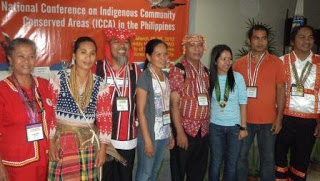 |
|
Participants of national conference on ICCAs in the
Philippines, which took place in March 2012. Photo via
iccaforum.org.
|
According to a notification of the Secretariat of the Convention on Biological Diversity (CBD), Indigenous peoples’ and local community conserved territories and areas (ICCAs) provide multiple ecological, cultural and biodiversity values, contribute greatly to food and water security and other ecosystem processes, and help achieve the Strategic Plan for Biodiversity 2011-2020 and Aichi Biodiversity Targets. ICCAs play a critical role in ensuring access and respecting rights to customary sustainable use and facilitating inter-generational communication of traditional environmental knowledge, innovations and practices. The Secretariat continues by noting that ICCAs are increasingly recognised as the living embodiment of both Articles 8(j) and 10(c) of the CBD.
In an effort to support implementation of these Articles and several past CBD decisions, on 13 October at the 11th Conference of the Parties to the Convention on Biological Diversity (
CBD COP11), the CBD Secretariat co-hosted a one-day colloquium on the role of ICCAs in achieving the 2011-2020 Aichi Biodiversity Targets, along with the governments of Brazil, India, Mexico, the Philippines, Senegal, and South Africa, the ICCA Consortium, the International Indigenous Forum on Biodiversity, and Conservation International.
The colloquium was opened by the Deccan Development Society and several Dalit farmers, who gave a spiritual blessing and spoke about the challenges they have faced on the road to securing food sovereignty. Opening remarks were given by the following esteemed speakers: Braulio Ferreira de Souza Dias (Executive Secretary, CBD); Delfin Ganapin (Global Coordinator, GEF Small Grants Programme); Russell Mittermeier (President, Conservation International); Taghi Farvar (President, ICCA Consortium); and Trevor Sandwith (Director, IUCN Global Protected Areas Programme). Following a presentation by John Scott and Sarat Gidda (CBD Secretariat) on the linkages between ICCAs and global policy, Ashish Kothari (Kalpavriksh) gave a keynote address on a global study compiled by the ICCA Consortium, Kalpavriksh, Natural Justice, and IUCN-TILCEPA on legal and non-legal forms of recognition and support for ICCAs. The study was published as
Technical Series Volume 64 by the CBD Secretariat. (A complementary global study coordinated by Natural Justice and Kalpavriksh on behalf of the ICCA Consortium focused in more depth on legal and institutional aspects of recognizing and supporting ICCAs and is available
online.)
The rest of the colloquium consisted of three engaging panels that highlighted experiences and lessons learned from Asia-Pacific, Africa, and Latin America and the Caribbean. Each panel was chaired by a government representative from the respective region and included presentations by Indigenous peoples, NGOs, and governments.
The CBD Secretariat’s official notification of the colloquium and the day’s programme can be viewed
here. A summary report is available
here. More information about the ICCA Consortium’s engagement in COP11 can be found
here.

